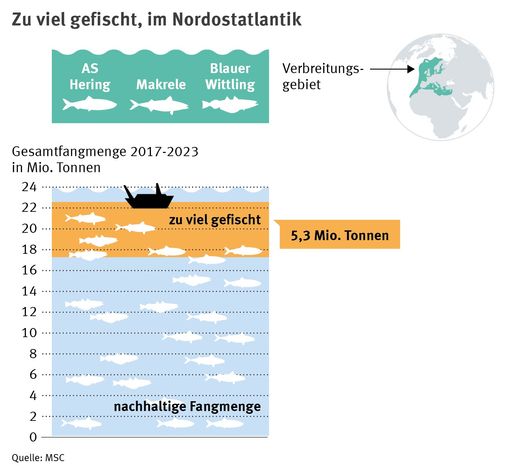The Marine Stewardship Council (MSC) is calling on fishing nations in the North Atlantic to end the political deadlock and agree on a permanent quota allocation for Atlantic herring, blue whiting and mackerel. This call follows the release of new scientific data from the International Council for the Exploration of the Sea (ICES) showing a worrying, ongoing downward trend for herring and mackerel. Both stocks are traditionally among the largest and economically most important fish stocks in Europe.
Fishing too much: herring and mackerel in free fall
The Atlantic-Scandian herring population has shrunk from 6.9 million tonnes to 3.1 million tonnes since 2008 and this year fell below the critical stock level at which the long-term health of a stock is at risk. Since 2015, the mackerel population has fallen from 7.26 million tons to 2.8 million tons today and is therefore only just above the endangerment threshold.
The current ICES report also shows that catches of Atlantic-Scandian herring and mackerel have once again exceeded the scientifically recommended limits by 33% and 35% respectively, similar to previous years. Limits are set to ensure the long-term viability of fish stocks. Continually exceeding them endangers the health of the oceans as well as the economy and the livelihoods of fishermen.
A current data analysis by the MSC shows that in the last seven years alone, the total catches of Atlantic-Scandian herring, mackerel and blue whiting have exceeded the scientifically recommended catch amount by almost a third, or 5.3 million tons. This means 5.3 million tonnes of fish that, if scientific advice had been followed, would have had to remain in the sea.
The reason for the problem: a lack of fishing quota agreements for the northeast Atlantic
Atlantic-Scandian herring, mackerel and blue whiting are fished by some of the richest nations in the world. But government negotiations regarding quota distribution have been deadlocked for years. Instead, each country sets its own quota – with the consequence that the sum of the individual quotas is significantly higher than the scientific recommendation. Thus, the failure of political negotiations leads to overfishing.3
Erin Priddle, regional director for the MSC in Northern Europe: “Recent data on Atlantic Scandinavian herring and mackerel are worrying. These two iconic fish species are of great importance to the marine ecosystem, to the European and global market and to the fishermen themselves. Governments must not hesitate any further to reach a common, sustainable quota agreement. We urgently need this to ensure the health of fish stocks in the Northeast Atlantic for future generations. The upcoming meeting of the northeast Atlantic coastal states in October 2024 must be an opportunity to finally reach such an agreement“.
Consequences also for consumers
The lack of progress in setting sustainable fishing quotas has also resulted in the North East Atlantic herring, mackerel and blue whiting fisheries losing their MSC certification in 2019 and 2020. This has also significantly limited the availability of sustainable fish to consumers. In Germany there are hardly any sustainable mackerel products on the shelf anymore, and the proportion of certified sustainable herring products in retail fell from 83% in 2020 to 40% in 2024.
LINKS: ICES advice 2024: Herring // ICES advice 2024: Mackerel
